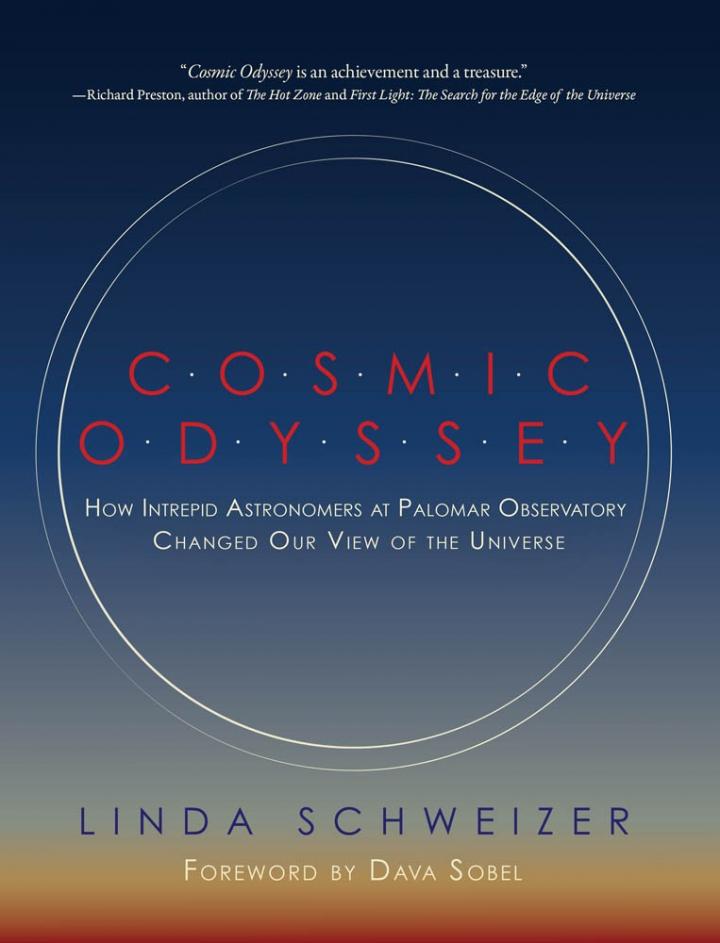New MIT Press looks at how intrepid astronomers at Palomar observatory changed our view of the universe

Credit: Brianna Schweizer, 2020.
Ever since 1936, pioneering scientists at Palomar Observatory in Southern California have pushed against the boundaries of the known universe, making a series of dazzling discoveries that changed our view of the cosmos: quasars, colliding galaxies, supermassive black holes, brown dwarfs, supernovae, dark matter, the never-ending expansion of the universe, and much more. In “Cosmic Odyssey,” astronomer Linda Schweizer tells the story of the men and women at Palomar and their efforts to decipher the vast energies and mysterious processes that govern our universe.
Palomar was the Apollo mission of its era. The first images from the 200-inch George Ellery Hale telescope, which was the world’s largest when it was dedicated in 1948, generated as much excitement as images from the moon in 1969 and from the Hubble Space Telescope more recently. So far, Palomar’s “Big Eye” and three other telescopes have yielded more than 75,000 telescope-nights of precious data. Schweizer takes readers behind the scenes of scientific discovery, mapping the often chaotic process of detours, dead ends, and serendipitous leaps of insight. Although her focus is on Palomar, she follows threads of discovery across the world to other teams and observatories. Based on more than one hundred interviews and enhanced by research in scientific journals, her account paints a fascinating picture of how discrete insights acquired over decades by researchers in a global community cascade, collide, and finally coalesce into the discoveries we come to accept as facts.
“Linda Schweizer’s Cosmic Odyssey is a thrilling account of the cosmological discoveries of the past century that ‘pulls back the curtain’ on the brilliant, eccentric scientists who achieved those breakthroughs…A comprehensive and gripping achievement, Cosmic Odyssey is destined to be a landmark work on the history of astronomy.”
–ForeWord Reviews, STARRED review
“Cosmic Odyssey vividly captures one of the greatest eras in the history of astronomy. Rich in scientific detail and written with an engaging flair, this account by Linda Schweizer–who played a role in the journey–reveals both the triumphs and foibles as 20th-century observers discovered a violent universe never before imagined. This should be required reading for every astronomer-in-training.”
–Marcia Bartusiak, author of The Day We Found the Universe and Einstein’s Unfinished Symphony
“In this extremely well-researched biography of one of astronomy’s ‘sacred mountains,’ Schweizer charts–in vivid and captivating detail–the many discoveries of the near and far universe and the minds and hands that propelled them.”
–Priyamvada Natarajan, Professor of Astronomy and Physics, Professor, Yale University; author of Mapping the Heavens: The Radical Scientific Ideas That Reveal the Cosmos
“Majestically told, lavishly illustrated, and meticulously documented, Linda Schweizer’s vivid portrayal of the personalities that brought the cosmos into focus–most notably Palomar Mountain, the renowned cosmic cathedral and the book’s protagonist–reads like a novel and is impossible to put down.”
–Brian Keating, Chancellor’s Distinguished Professor of Physics, University of California, San Diego; author of Losing the Nobel Prize
“The 200-inch telescope at Palomar Mountain ruled as the world’s premier astronomical instrument for 40 years. In Cosmic Odyssey, Linda Schweizer goes beyond the masterful technology to show what this marvel was used for, who was doing it, and what they achieved.”
–Robert P. Kirshner, Professor of Science, Harvard University; author of The Extravagant Universe
“Cosmic Odyssey is an important book that tells the story of the Palomar Observatory, one of the most important groups of scientific instruments in history. Schweizer gives us crystalline detail, deep knowledge of the process of science, and intimate portraits of great astronomers, deepened by years of conducting interviews with them. Cosmic Odyssey is an achievement and a treasure.”
–Richard Preston, author of The Hot Zone and First Light: The Search for the Edge of the Universe
Linda Schweizer holds a PhD in astronomy from the University of California, Berkeley. She has observed at many observatories, published in astronomical journals, and taught science writing and was a Visiting Scholar at the California Institute of Technology, all while raising four daughters.
###
Media Contact
Nicholas DiSabatino
[email protected]





